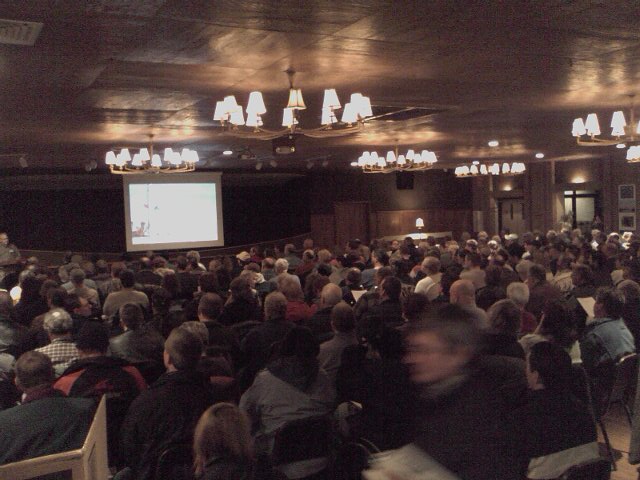Entries in Invenergy (41)
5/2/10 How long can they keep denying the problem exists? Dear Wind Siting Council, please read this letter from a wind project resident who was forced to leave her home because of wind turbine noise.
Click on the image below to watch a video interview with Barbara Ashbee, one of the wind project residents in Ontario forced out of her home by wind turbine noise.
To: All Liberal and NDP MPP's in Ontario.
Minister Gerretsen, Minister Duguid, Premier McGuinty and Minister Matthews
On Wednesday April 28, 2010 by your words and actions, you very forcefully told me via the media and formally at Queens Park in the Legislature, that my husband and I are not credible.
You told many Ontario families that they are not credible.
You told Dr. Robert McMurtry and Carmen Krogh that they are not credible even with their exceptional credentials and unparalleled professional experience.
Not one of you has ever called me or interviewed me.
Your incompetence, your neglect and your apathy forced my husband and I from our home. You are fully to blame and I resent that you continue to do this to additional families in Ontario with all of the information you have at hand.
Instead of correcting the problems your choice is to continue to publicly and callously demoralize and cause harm to people.
While you were spouting your negligent commentaries about the extensive research done in Europe, and your brazen and completely inaccurate statements that they have no problems associated with wind turbines, in the gallery not only was Norma Schmidt who had the astonishing courage to stand and speak up because she couldn't take listening to any more, but there was a lot more going on.
For those of you who spoke by voting against the moratorium and those who spoke on behalf of your parties that day I want you to imagine being forced to leave your home.
Imagine that you, your spouse and your children are sick and can no longer sleep and thrive in your own home. Imagine all of the arrangements you have to make. Where do you go? Where do the kids go?
Who'll take the cat and 2 dogs? Will you have to separate them, board them?
How will you pay your mortgage and utilities and still afford another place to rent? Do you have to get a line of credit? Who will even consider giving you one if you're admitting you can't live in your home. It will be now worthless and of no value to the bank.
What do you take with you? Everything?...or just the bare minimum to live on? What about the stuff you have to leave? Will it be safe or will the house be broken into now that it's been abandoned. How can you just leave everything?
What do you say to the kids teachers when they've been uprooted, are having difficulty in school and you can't trust that they will understand because nobody believes it. Will they suspect that you and your spouse are splitting up for other reasons?
How do you protect your children from being ridiculed by other families in the community? How can you do all this and do your job, when you are so deprived of sleep you cannot even form a coherent sentence. Is there a government assistance program that can help you find temporary accomodations, who can help financially and emotionally? Why isn't somebody listening and why isn't your government helping you?
On April 28th, 2010 I know that there were at least 15 people present who have already gone through, or are going through these questions right now. These brave people were able to attend this important day by leaving their jobs and travelling for hours by car, bus and GO Transit.
I don't know how many more of them were actually present because I certainly don't know them all, but their presence represented all of the victims in the province and you stood up in front of them and revictimized them over and over again with your inept and unresearched comments. You told the world that all of these people have no credibilty.
Present that day was a teenager, who became so sick that her parents had to send her to live with relatives until they too could find alternate accomodations. They had to find homes for most of their animals, but still return to their abandoned farm daily to care of some they can't get moved yet.
They also have full time jobs. These people were there, listening to you from the gallery. So too was a neighbour of theirs who is too sick to stay in their home and has to sleep elsewhere at night. And a senior citizen who has to stay in a rental house.
There were multiple families who built brand new homes, their dream homes and now they cannot finish them. They have lost the desire and energy to finish their plans. They cannot continue to live there. They are sick. They too were in the gallery.
The dreams and the daily lives of these families are being crushed, and yet these people still made it to this important event at Queens Park on April 28th, 2010. Many in attendance have been forced from their homes and I personally know other families, unable to make it, that have also had to abandon their homes. Who knows for sure how many more are suffering in silence. So tell me, what is the magic number you are all waiting for? How many people?
What a shameful comment that after listening to the passionate plea for acknowledgment and help that came from your gallery, you actually returned to finish your dicrediting and dismissal of adverse health effects and voted against the moratorium. Unbelievable.
At some point the media will get wise to your sly "extensive research" and "best sciences" statements and will start doing their own research and interviews instead of relying on you for comment.
Good luck with that.
Barbara Ashbee
RR1 Orangeville, Ontario
L9W 2Y8
4/6/10 Adverse Health Effects? The wind industry says there are none.
![]() NOTE FROM THE BPWI RESEARCH NERD: For those who had trouble accessing the video of the April 1st Wind Siting Council Meeting, the settings have been changed so they are all now viewable to the public. CLICK HERE for the links.
NOTE FROM THE BPWI RESEARCH NERD: For those who had trouble accessing the video of the April 1st Wind Siting Council Meeting, the settings have been changed so they are all now viewable to the public. CLICK HERE for the links.
CLICK HERE for location, time and dates of WSC meetings. These meetings are open to the public. Better Plan, Wisconsin encourages you to attend.
THIRD Wind Siting Council Meeting Notice
Wednesday, April 7, 2010, beginning at 9:00 a.m.
Docket 1-AC-231
Public Service Commission of Wisconsin
Amnicon Falls Conference Room (1st Floor) Public Service Commission Building 610 North Whitney Way, Madison, Wisconsin
This meeting is open to the public
Home in a Wisconsin Wind Project
To address the growing number of complaints and health concerns about adverse health effects from wind farm noise and shadow flicker, the American Wind Energy Association (AWEA)and the Canadian Wind Energy Association (CanWEA), hired medical doctors, audiologists, and acoustical professionals to review recent literature on the issue. The resulting report, "Wind Turbine Sound and Health Effects" was released in December 2009. Their conclusion?
Other equally qualified medical doctors, audiologists, and acoustical professionals have reviewed the same literature and have come to the opposite conclusion.
CLICK HERE to visit the Adverse Health Effects page at The Society for Wind Vigilence Website
CLICK HERE to read their review of the AWEA/CanWEA report.
Their advisory panel includes:
Robert Y. McMurtry, M.D., F.R.C.S.(C), F.A.C.S.
Michael A. Nissenbaum, M.D.
Roy D. Jeffery M.D.,FCFP (Can)
Christopher Hanning, BSc, MB, BS, MRCS, LRCP, FRCA, MD
Carmen Krogh, BScPharm, Secretariat
Richard R. James, INCE
John Harrison, PhD
David L. White, EET, CMBB
 ANOTHER NOTE FROM THE BPWI RESEARCH NERD: If you are a Wisconsin resident currently having problems with wind turbine noise or shadow flicker, CLICK HERE to Contact Healthy Wind, Wisconsin
ANOTHER NOTE FROM THE BPWI RESEARCH NERD: If you are a Wisconsin resident currently having problems with wind turbine noise or shadow flicker, CLICK HERE to Contact Healthy Wind, Wisconsin
"HWW - Healthy Wind, Wisconsin’s mission is to keep active track of wind-related health issues affecting Wisconsin families. We are committed to assisting residents of Wisconsin who have been impacted by poorly sited wind turbines by processing resident’s complaints and monitoring the progress toward complaint resolution."
2/19/10 TRIPLE FEATURE: CORRECTION: We were wrong. It was MONROE county not Brown County AND When it comes to the ways of wind developers, the cat that lost its tongue found it on Thursday night in Brown County AND what does it take to come between a father and son? Would you guess a payment from a wind developer? AND Wisconsin wind farm residents are not alone in health complaints
 Concerns about proposed Invenergy project drew capacity crowd to Thursday's BCCRWE meeting
Concerns about proposed Invenergy project drew capacity crowd to Thursday's BCCRWE meeting
Correction: Better Plan was in error when reporting that residents who spoke out against the Invenergy project proposed for Brown County found dead skunks and deer heads on their mailboxes.
The dead skunks and deer heads were found on the mail boxes of those who spoke out against an Invenergy project in Monroe County
Better Plan regrets the error.
Concerns about proposed Invenergy wind project draws capacity crowd to meeting in Brown County
By Lynda Barry
February 20, 2010
KAUKANA- It was standing room only in Van Able's restaurant after residents quickly filled the five hundred seats in the banquet hall and overflowed into a side room.
Community members came to hear concerns about Chicago-based Invenergy's 100 turbine Ledge Wind project which would occupy the Towns of Morrison, Holland, Wrightstown and Glenmore, making it the largest wind development in the state.
The event was organized by a grassroots community organization called Brown County Citizens for Responsible Wind Energy (bccrwe.com) and drew a capacity crowd.
Along with speakers who addressed the now well-known issues of turbine noise, sleep loss, shadow flicker, loss of property value and impacts on farm animals, local residents had the chance to hear about something rarely spoken about in public.
Landowners detailed their first hand experiences with the questionable techniques used by Invenergy to convince them to sign onto the project.
They spoke about being lied to by developers who said their neighbors had signed onto the project when in fact they had not. They spoke about the varying amounts of money offered to different landowners even as Invenergy claimed publicly that all landowners were getting the same amount.
Some landowners talked about about what made them decide not to sign on to the project while others expressed deep regrets about having signed the contracts.
There were several discussions about what options landowners had for getting out of contracts and along with concerns about being sued by the wind company.
Speakers also talked about about the negative impact the proposal has had on the community and spoke about the new hostilities between neighbors and family members.
A speaker from Monroe county mentioned that in his community residents who spoke publicly against the project were soon greeted by dead skunks and deer heads on their mailboxes. Some felt the wounds made to this previously strong community would never heal.
Invenergy representatives were in attendance but did not openly identify themselves and remained quiet throughout the meeting.
More on this story to come.
SECOND FEATURE
Wind farm debate divides families
WBAY-TV, www.wbay.com
by Jeff Alexander
February 17 2010
Plans to build the state’s largest wind farm in southern Brown County is dividing several rural communities. It’s even causing turmoil within families.
For almost a year now, Roland Klug has lobbied his neighbors to join him in signing contracts with a Chicago company to build 400-foot wind turbines on their land in Morrison. As Roland sees it, it’s a sign of the times.
“Some people hate them. I love them. I think it’s progressive. It’s a country moving forward,” Roland said.
But just a mile away is another sign with a very different message put up by Roland’s son, Dave.
Like many families in this farming country, the Klugs are at odds with each other.
“It is very, very trying I will say right now,” Dave said.
As Dave sees it, the prospect of 100 turbines towering over the landscape is appalling. The fact that four could be as close as 1,000 feet from his home is scary, he says.
He points to research he says he’s done on other wind farm developments around the country and the impact on nearby residents.
“Every one we read about are having all kinds of health issues, property values drop, and to me I guess it just doesn’t seem like it’s a real good investment for our community,” Dave said.
But according to Roland, it’s an investment that will help him keep his farm. He’s signed on for two turbines that will pay him $20,000 a year.
Roland says he “had to sell off 48 acres to make a payment for a couple of years, and we’d have to just keep selling off.”
Roland knows he’s made some neighbors angry. “My son gets very mad.”
Dave said, “My son is 21 and was all set to buy some land right by me which would’ve been my dream, been great, but right now we had to put it all on hold. You cross your fingers, but he’s probably going to end up living somewhere else.”
Roland says, “I just know in time it’ll all straighten out, it always does.”
Dave Klug, though, isn’t so sure. Especially if the wind turbines go in.
There is a meeting scheduled for Thursday night called “Living in an Industrial Wind Turbine Project.”
It’s at Van Abel’s in the Town of Holland. Doors open at 6 P.M. and speakers begin at 7.
NEW! CLICK HERE to watch a video about wind farm residents in Australia who describe sleep loss, health problems and other complaints identical to those reported by Wisconsin wind farm residents.
For those with slower internet connections CLICK HERE to read the transcript of the interview
NOTE FROM THE BPWI RESEARCH NERD: People who live in Rock County may be interested in the wind company's response to resident's complaints. Spanish owned Acciona is the same company that now owns the leases to land in the Towns of Magnolia and Union. Better Plan, Wisconsin has contacted Acciona several times to ask about their plans for the community. Acciona has not replied.
 WANT MORE? CLICK HERE TO READ TODAY'S "WIND TURBINES IN THE NEWS"
WANT MORE? CLICK HERE TO READ TODAY'S "WIND TURBINES IN THE NEWS"
2/12/10 The wind developer told us that modern wind turbines are no louder than a refrigerator and "whisper quiet"
2/9/10 TRIPLE FEATURE: Dude, Where's My Wind Farm Stimulus Money? AND When an 'empty gesture' is full of meaning: Town of Holland's wind moratiorium and what the PSC says about it, AND What's that smell? Is it the conflict-of-interest problem in Brown County?
New Wind Farms in the U.S. Do Not Bring Jobs
Millions have been invested in wind farms, but it hasn't brought jobs
Click Here for Source: ABC World News
Jonathan Karl
Feb. 9, 2010
Despite all the talk of green jobs, the overwhelming majority of stimulus money spent on wind power has gone to foreign companies, according to a new report by the Investigative Reporting Workshop at the American University's School of Communication in Washington, D.C.
Nearly $2 billion in money from the American Recovery and Reinvestment Act has been spent on wind power, funding the creation of enough new wind farms to power 2.4 million homes over the past year. But the study found that nearly 80 percent of that money has gone to foreign manufacturers of wind turbines.
So Where Are the Jobs?
"Most of the jobs are going overseas," said Russ Choma at the Investigative Reporting Workshop. He analyzed which foreign firms had accepted the most stimulus money. "According to our estimates, about 6,000 jobs have been created overseas, and maybe a couple hundred have been created in the U.S."
Even with the infusion of so much stimulus money, a recent report by American Wind Energy Association showed a drop in U.S. wind manufacturing jobs last year.
Sen. Chuck Schumer, D-N.Y., called the flow of money to foreign companies an outrage, because the stimulus, he said, was intended to create jobs inside the United States.
"This is one of those stories in Washington that when you tell people five miles outside the Beltway, or anywhere else in America, they cannot believe it," Schumer told ABC News, "It makes people lose faith in government, and it frankly infuriates me."
Matt Rogers, the senior adviser to the Secretary of Energy for the Recovery Act, denied there was a problem.
"The recovery act is creating jobs in the U.S. for American workers," said Rogers, "That is what the recovery act is about, that is what it is doing. Every dollar from the recovery act is going to create jobs for the American workers here in the U.S."
How Did This Happen?
Several of the large European turbine manufacturers had limited manufacturing facilities in the United States, but there was nothing in the stimulus plan that required that the turbines, or any other equipment needed for the wind farms, be made here, said Rogers. There are strict "Buy America" provisions in the Recovery Act, but this Green Energy Stimulus initiative turned the existing tax credits into cash grants, bypassing the "Buy America" provision.
Iberdrola, one of the largest operators of renewable energy worldwide, is based in Spain and has received the most U.S. stimulus dollars -- $577 million. It buys some of its turbines from another Spanish manufacturer, Gamesa, which has a U.S. connection. Gamesa has two facilities to manufacture turbine blades in Pennsylvania, but the company said the market forced it to temporarily lay off nearly 100 workers.
Eric Sheesley was one of those laid off from the Gamesa plant before Thanksgiving. "When we're employing other countries, we can't feed our kids at home. It gets hard you know." Sheesley had a glimmer of hope when a letter arrived this week telling him to report back to work next week.
One reason so much money is going overseas is that there is not much of a wind power industry in the United States -- only two major American manufacturers make wind turbines: General Electric Energy and Clipper Wind based in Carpinteria, Calif. Even those companies do a significant amount of their manufacturing overseas. General Electric told ABC News that GE's Renewable Energy business has 3,000 employees around the world, 1,350 here in the United States.
Schumer said the way to revitalize the domestic wind power industry and to create green jobs is to require that at least some of the turbine equipment to be made in the United States.
An American Farm With Chinese Jobs
Perhaps the most controversial wind project is one that has yet to receive stimulus money.
A Chinese company called A-power is helping to build a massive $1.5 billion wind farm in West Texas. The consortium behind the project expects to get $450 million in stimulus money.
Walt Hornaday, an American partner on the project, said it would create some American jobs. "Our estimation," he said, "is that we are going to have on the order of 300 construction jobs just within the fence of the project."
But that's in addition to 2,000 manufacturing jobs -- many of them in China.
Lauren Reynolds, a reporter at ABC's San Diego affiliate 10 News, paid a visit to the vacant office of A-power.
To read more about how wind energy companies in San Diego are forced to spend their federal stimulus dollars abroad, go to today's San Diego Tribune and the Watch Dog Institute's Web page.
Second Feature:
Holland backs hollow wind farm moratorium
If the town wants a moratorium, the state has no reason to disagree, said PSC spokeswoman Teresa Weidemann-Smith.
“It’s the community’s right to make those decisions,” she said. “But ultimately, the decision by the PSC will take precedence.”
February 9, 2010
Local solidarity is driving a Holland wind farm moratorium that has no chance of success if the Public Service Commission of Wisconsin approves a project in the town.
“We know the PSC will have final say in this project,” said Holland Supervisor Michael Geiger. “We’re just letting them know how we feel about it. When it comes to town politics, we’re about as grass roots as you get.
“The people that live next door want to know you’re supporting them. That’s what I’m doing.”
Holland is one of four Brown County towns targeted by Chicago-based Invenergy LLC for the estimated 100-turbine Ledge Wind Farm. If the project advances, Geiger said, Invenergy could build 22 turbines in Holland.
But the town has enacted a one-year moratorium on wind farm development and revised its setback standards for turbines from 1,000 feet to a half-mile from buildings.
Invenergy representatives did not return calls for comment.
If the town wants a moratorium, the state has no reason to disagree, said PSC spokeswoman Teresa Weidemann-Smith.
“It’s the community’s right to make those decisions,” she said. “But ultimately, the decision by the PSC will take precedence.”
The PSC has authority over projects expected to generate more than 100 megawatts of electricity. Weidemann-Smith said the Ledge project is expected to generate 150 megawatts.
According to state law, if the PSC approves a project, it can proceed despite any local ordinance prohibiting the project.
The PSC has not yet begun its review of the Ledge Wind Farm proposal, Weidemann-Smith said, because Invenergy has not submitted a complete proposal for the project. She said she does not know when that will happen.
Once the PSC begins its formal review of the project, she said, there will be plenty of time for local comments.
The comments are coming in already. The PSC has an open docket on the project with more than 80 public comments.
Jon Morehouse, a member of the executive committee for Brown County Citizens for Responsible Wind Energy, said waiting until the public comment period to speak out against the project would not send as strong a message.
“The moratorium is something that was voted on and publicized,” he said. “If you say nothing, you get run over.”
The Brown County citizens group encouraged the town to enact the moratorium, Geiger said, and the other towns in line to host Ledge turbines also are being encouraged to enact moratoriums. He said he knows the moratorium means nothing if the PSC approves the project, but an empty gesture is better than no gesture.
“The residents at the last two meetings have said they’re prepared to fight,” he said. “I don’t know how they’ll do that, and I don’t really want to know. All I know is with the moratorium, I’m doing something the majority wants.
“If you don’t do something they want, they’ll get somebody who will.”
VISIT THE DAILY REPORTER’S SPECIAL WIND FARM PROJECT PROFILE PAGE
THIRD FEATURE:
Wind farms causing conflict-of-interest controversies among Brown County town boards
As Brown County pursues wind farm bans, some of their officials have already signed contracts for turbines
February 10, 2010
By Scott Williams
As residents seek help stalling a wind farm development in southern Brown County, some local officials are facing conflict-of-interest questions because they have signed deals with the developer allowing wind turbines on their property.
The issue has ensnared town board members in Morrison and Wrightstown, and it is slowing action on wind farm opponents' efforts to delay the development.
Morrison Town Board members on Tuesday postponed action on a proposed wind farm ban because they are awaiting legal opinions on whether Trustees Kevin Collins and Ron Lemke should participate in the decision.
Collins and Lemke both have signed contracts with Invenergy LLC, the Chicago-based developer that wants to build Brown County's first major commercial wind farm. The developer has offered about $8,000 a year to landowners willing to permit a 400-foot wind turbine on their property.
Morrison Town Chairman Todd Christensen said he would not allow the board to discuss the wind farm until determining whether Collins or Lemke has a conflict.
"We're stepping very carefully here," Christensen said. "I just don't want to put anybody in any situation where they're going to get into trouble."
The same predicament faces Wrightstown Town Chairman William Verbeten and Trustee Ronald Diny, both of whom have signed contracts with Invenergy.
With a vote scheduled tonight in Wrightstown on a proposed moratorium on wind farm construction, Verbeten said he might abstain from the vote or postpone action entirely.
Verbeten said Tuesday that he signed a deal allowing a wind turbine on his property before he realized the Town Board would play a role in the development. The final decision on large commercial wind farms in Wisconsin normally comes from the state Public Service Commission.
"We weren't going to be involved," Verbeten said. "We were out of it."
But an opposition group known as Brown County Citizens for Responsible Wind Energy is pushing local elected officials to impose moratoriums or take other action to derail the project.
State law prohibits elected officials from participating in any official issue in which they have a substantial financial interest.
Reid Magney, spokesman for the state Government Accountability Board, said the law does not define substantial financial interest, but state officials interpret it to mean anything more than token.
"We would expect local elected officials — and companies doing business in Wisconsin — to know the law and not put local elected officials in jeopardy," Magney said.
Invenergy is seeking state approval to build 100 wind turbines in southern Brown County, including 54 in Morrison and 20 in Wrightstown. The rest would be built in the towns of Holland and Glenmore, although Holland Town Board members last week approved a one-year moratorium.
Invenergy contends that such local roadblocks are meaningless because state regulators can override all such obstacles when they decide whether to permit the project.
Company vice president Joe Condo said town trustees in Brown County perhaps should abstain from official decisions if those trustees have signed contracts to participate in the development. But considering that the state has the final say, Condo added, "It's really a moot point."
An attorney advising Morrison officials has outlined other ways that the town could involve itself, including passing a resolution on the wind farm proposal or intervening in the state regulatory case.
Steven Gillis, the town of Wrightstown attorney, said he does not perceive a conflict for Verbeten or Diny, at least not on the moratorium issue scheduled to be discussed tonight.
Gillis said he still must conduct more research to determine if the trustees could participate in other issues related to the project, including a local conditional use permit that he believes will be required for the wind farm.
"We'll cross that bridge when we come to it," he said.
Diny and Lemke could not be reached for comment.
Collins declined to discuss his Invenergy contract except to say that although he sees no conflict, he would abstain from any Town Board vote if necessary.
Asked how a three-member board could decide an issue without two members participating, Collins said, "I'm not sure how they'll address that."
Morrison Town Board members have called a special town meeting for 7 p.m. March 8, at a location to be announced, to air public opinions on the wind farm.

